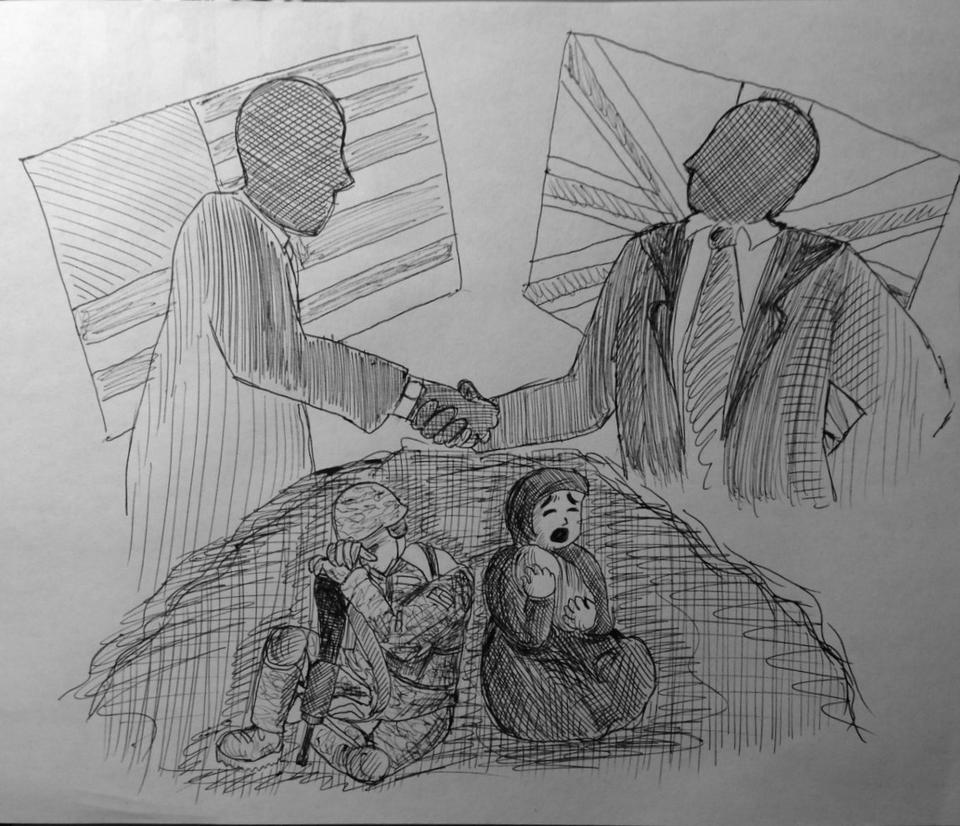
News
Harvard Quietly Resolves Anti-Palestinian Discrimination Complaint With Ed. Department

News
Following Dining Hall Crowds, Harvard College Won’t Say Whether It Tracked Wintersession Move-Ins

News
Harvard Outsources Program to Identify Descendants of Those Enslaved by University Affiliates, Lays Off Internal Staff

News
Harvard Medical School Cancels Class Session With Gazan Patients, Calling It One-Sided

News
Garber Privately Tells Faculty That Harvard Must Rethink Messaging After GOP Victory
How This Ends
Ten years later, introspection has failed within the foreign policy community

In the days before the 2003 Iraq invasion, General David Petraeus provided a telling quotation to a journalist. “Tell me how this ends,” he asked, and 10 years later, we are still not really sure.
March 20 marks the 10-year anniversary of a war commonly considered the worst decision in the history of U.S. foreign policy since Vietnam. The expected commentaries and reflections have appeared in the past month within the academic and policy wonk circles. Political blogger Andrew Sullivan, for example, has extensively evaluated his own support for the Iraq War, and many of his journalistic colleagues have followed suit.
Alternately, academics like Harvard Kennedy School Professor Stephen Walt have emphasized the small minority who did not support the invasion. He has also noted the conspicuous absence of these dissidents from prominent positions in the U.S. foreign policy community. Although many have had illustrious and notable careers as academics, few have served the U.S. government in an official capacity.
Those who supported the war, though, have held significant positions throughout the Department of Defense, Department of State, and other U.S. government agencies. Notably, this trend has not changed under the administration of President Obama, whose opposition to the war helped propel him into the national spotlight in the first place.
For these reasons, among others, it is particularly striking that the U.S. foreign policy community ignored a needed opportunity for introspection about the events that led to the Iraq War. More than anything else, the war has become a footnote within America’s march through the course of history. While not yet forgotten entirely, the lessons of Iraq remain unheard.
This was particularly evident during the confirmation hearings of Senator Chuck Hagel for the Secretary of Defense. Amidst an aggressive smear campaign, the line of questioning about Iran’s nuclear program showed that the ideological foundations of the Iraq War remain strong within the halls of the Capitol.
The Bush administration primarily justified its actions within Iraq on the basis of preventive war, as opposed to preemptive war. Within international law, a state can legally use force without first being attacked only if the opposing state presents an imminent threat. If the United States knew that North Korea, for example, had the capabilities and intentions to strike the United States with a nuclear weapon, the U.S. could legally target North Korean missiles sites as a preemptive measure.
Preventive war, however, argues that a state may justify the use of force against another state because that state may in the future pose an imminent threat, even if the state does not yet have the capability to conduct a credible strike.
It is a troubling argument that rests itself on the shifting sands of the hypothetical. And the Iraq War showed the full extent of costs in an engagement in which the benefits remain solely hypothetical. Over time, the United States became engaged within a foreign, sectarian conflict that consumed resources, time, and, most importantly, lives, over a fear that never actually materialized.
The recent debate about Iran’s nuclear weapons program, particularly within the more conservative elements of the Republican Party, demonstrates that the Iraq War did not sufficiently disprove the risks implicit within the doctrine of preventive war. And a significant part of this continuation stems from the dominance of ideological over strategic interests within the U.S. foreign policy community.
Neoconservative ideologies dominated the Republican Party in the development of the Iraq War. And similar ideologies still maintain a stronghold over the party today, even if it identifies itself differently.
Granted, some have argued that Senator Rand Paul’s recent filibuster has provided a symbolic victory for realism, but it can only represent the beginning of a long fight against an entrenched system of beliefs. Much like the debates over the future of the Republican Party after the 2012 elections, it will be a brutal and potentially futile affair.
Yet if the ideology that made the Iraq War possible still exists today, it only makes sense to assume that it could cause further conflicts in the future.
Much like our involvement in Vietnam, Iraq may very well remain a haunting period of our history, extensively studied but rarely analyzed. While individuals may introspectively evaluate their decisions at the time, their efforts can only succeed in further prevention if applied on a larger scale.
Ten years later, we already know how this ends. Now we just need to hear what happened.
Raul Quintana ’14, a Crimson editorial writer, is a social studies concentrator in Leverett House. He is studying abroad at the University of Oxford this semester. His column appears on alternate Fridays.
Want to keep up with breaking news? Subscribe to our email newsletter.
